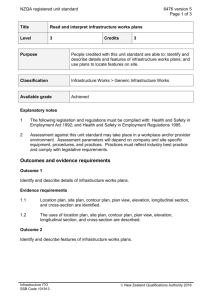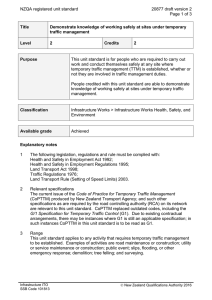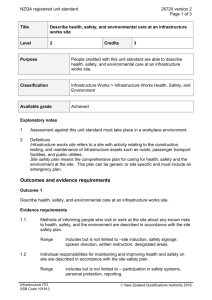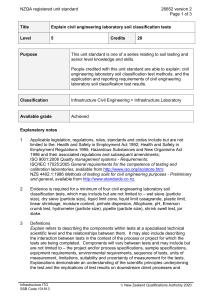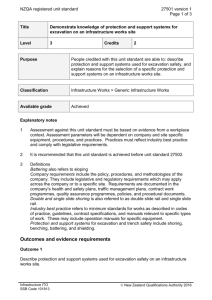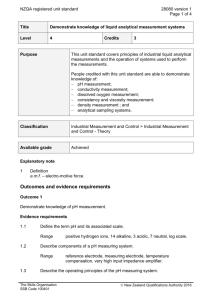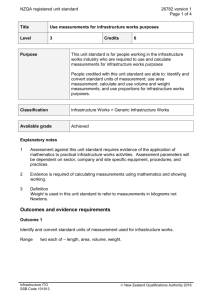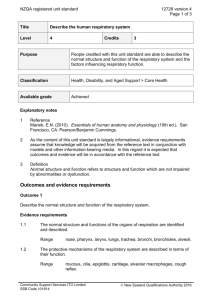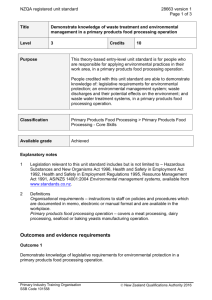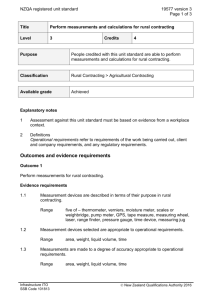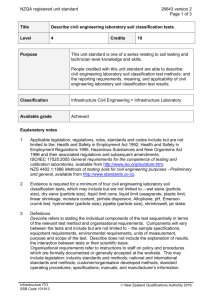26136 Support team, multidisciplinary and cross cultural work in
advertisement
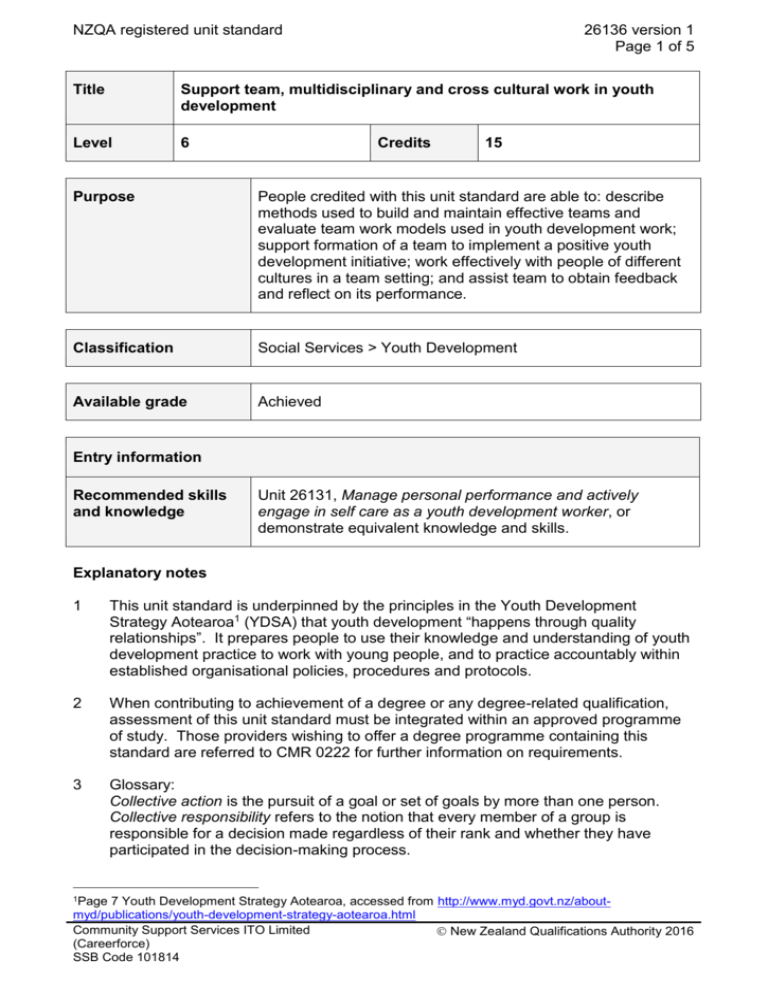
NZQA registered unit standard 26136 version 1 Page 1 of 5 Title Support team, multidisciplinary and cross cultural work in youth development Level 6 Credits 15 Purpose People credited with this unit standard are able to: describe methods used to build and maintain effective teams and evaluate team work models used in youth development work; support formation of a team to implement a positive youth development initiative; work effectively with people of different cultures in a team setting; and assist team to obtain feedback and reflect on its performance. Classification Social Services > Youth Development Available grade Achieved Entry information Recommended skills and knowledge Unit 26131, Manage personal performance and actively engage in self care as a youth development worker, or demonstrate equivalent knowledge and skills. Explanatory notes 1 This unit standard is underpinned by the principles in the Youth Development Strategy Aotearoa1 (YDSA) that youth development “happens through quality relationships”. It prepares people to use their knowledge and understanding of youth development practice to work with young people, and to practice accountably within established organisational policies, procedures and protocols. 2 When contributing to achievement of a degree or any degree-related qualification, assessment of this unit standard must be integrated within an approved programme of study. Those providers wishing to offer a degree programme containing this standard are referred to CMR 0222 for further information on requirements. 3 Glossary: Collective action is the pursuit of a goal or set of goals by more than one person. Collective responsibility refers to the notion that every member of a group is responsible for a decision made regardless of their rank and whether they have participated in the decision-making process. 1Page 7 Youth Development Strategy Aotearoa, accessed from http://www.myd.govt.nz/aboutmyd/publications/youth-development-strategy-aotearoa.html Community Support Services ITO Limited New Zealand Qualifications Authority 2016 (Careerforce) SSB Code 101814 NZQA registered unit standard 26136 version 1 Page 2 of 5 Discrimination is the unfair or less favourable treatment of one person when compared with another person in the same or similar circumstances. Discrimination may be unlawful if it based on any of the following: sex (including pregnancy); disability (including reliance on a guide dog, wheelchair or other aids); marital status; age; religious belief; political opinion; colour; race; family status; employment status; sexual orientation; and ethnic or national origins. Ostracism is the process whereby people are excluded from interactions with others or from an event or service. Positive youth development initiative means a specific intervention, activity or programme of activities designed, using positive development principles, philosophies and practices, to produce a positive outcome for a young person or group of young people. Teams are groups of people working together for the same goal or purpose. They can include multi-disciplinary, interagency and multi-organisational teams in government and non-government social service organisations, health or education providers. Team members can include volunteers, employees and other professionals. Youth/young people are people between the ages of 12 and 24. 4 Assessment notes: This unit standard may be assessed against evidence of demonstrated performance in the workplace and/or through the use of simulated workplace settings in an educational environment. Workplace settings can include field or practice learning placements. Outcomes and evidence requirements Outcome 1 Describe methods used to build and maintain effective teams and evaluate team work models used in youth development work. Evidence requirements 1.1 Methods used to build and maintain effective teams in youth development work are described. Range 1.2 three methods, one of which must incorporate kaupapa Māori. Description includes but is not limited to – outline of the method, outline of the theories underpinning the method, strengths and limitations of the method, any cultural or ethical considerations in its application, how it gives effect to the principles of positive youth development. Suitability of team work models for working in youth development settings is evaluated. Range three models, one of which must incorporate kaupapa Māori. Evaluation includes – suitability of team work model to work with youth development workers, young people, multidisciplinary teams, inter-agency teams. Community Support Services ITO Limited (Careerforce) SSB Code 101814 New Zealand Qualifications Authority 2016 NZQA registered unit standard 1.3 26136 version 1 Page 3 of 5 Factors impacting effective team work are discussed. Range a minimum of ten factors. Discussion includes but is not limited to – factors that support effective team work such as – communication, engagement, having a clear purpose, setting clear expectations, enabling people to contribute; factors that hinder effective team work including – inappropriate use of power, secrecy, discrimination, ostracism, lack of clear systems and processes. Outcome 2 Support formation of a team to implement a positive youth development initiative. Range one youth development worker team and one multidisciplinary team. Support includes but is not limited to – assisting in the selection of team members, providing information and training, coaching and mentoring, providing feedback on performance, peer support. Evidence requirements 2.1 Team members are selected and supported to identify team roles and agree leadership and other responsibilities within the team. Range 2.2 Team members are supported to agree work plan and mode of working according to organisational protocols. Range 2.3 roles and responsibilities include but are not limited to – leadership, specialist roles, support roles, individual responsibilities, collective responsibilities of the team. work plan includes but is not limited to – team purpose and scope; team goals, objectives and potential lifespan; criteria for success; conflict resolution process; ground rules to ensure effective working relationships; process for sharing information within professional, ethical and organisational boundaries; tasks requiring collective action. Team is supported to agree indicators for monitoring team success in the implementation of a positive youth development initiative. Range success indicators include but are not limited to – meeting agreed goals, outputs and timeframes; working within allocated budgets; stakeholder feedback; team member feedback. Community Support Services ITO Limited (Careerforce) SSB Code 101814 New Zealand Qualifications Authority 2016 NZQA registered unit standard 26136 version 1 Page 4 of 5 Outcome 3 Work effectively with people of different cultures in a team setting. Range evidence of working with people of a culture different from candidate's own. Evidence requirements 3.1 Strategies are described and used to build relationships with people of different cultures. Range a minimum of two strategies. Description includes but is not limited to – outline of the strategy used; theoretical underpinnings; how it addresses differences in culture, beliefs and practices; how it overcomes the potential for discrimination and ostracism; strengths and limitations; skills, values and attributes required to supports its use. 3.2 Language relevant to youth is used in culturally appropriate ways including pronunciation and meaning in the context in which it is used. 3.3 Disagreements and conflicts between team members are identified and discussed to determine an approach to resolve differences. Range 3.4 discussion includes but is not limited to – causes of disagreement and conflict including differences in power and authority, cultural differences, differences in values and belief; approach to address causes of disagreement and conflict. Information is obtained from team members about the extent to which they feel valued, safe and to which differences in culture, values and beliefs have been respected. Outcome 4 Assist team to obtain feedback and reflect on its performance. Range one youth development work team and one multidisciplinary team. Evidence requirements 4.1 Team is assisted to select a method for obtaining feedback on its effectiveness, taking into account organisational protocols and culture. 4.2 Team is supported to obtain feedback on its performance from client groups, and individual members of the team, against agreed success indicators. 4.3 Team is supported to use feedback to reflect on its performance and to determine changes and improvements to team work. Community Support Services ITO Limited (Careerforce) SSB Code 101814 New Zealand Qualifications Authority 2016 NZQA registered unit standard Planned review date 26136 version 1 Page 5 of 5 31 December 2013 Status information and last date for assessment for superseded versions Process Version Date Last Date for Assessment Registration 1 14 April 2011 N/A Consent and Moderation Requirements (CMR) reference 0222 This CMR can be accessed at http://www.nzqa.govt.nz/framework/search/index.do. Please note Providers must be granted consent to assess against standards (accredited) by NZQA, before they can report credits from assessment against unit standards or deliver courses of study leading to that assessment. Industry Training Organisations must be granted consent to assess against standards by NZQA before they can register credits from assessment against unit standards. Providers and Industry Training Organisations, which have been granted consent and which are assessing against unit standards must engage with the moderation system that applies to those standards. Requirements for consent to assess and an outline of the moderation system that applies to this standard are outlined in the Consent and Moderation Requirements (CMRs). The CMR also includes useful information about special requirements for organisations wishing to develop education and training programmes, such as minimum qualifications for tutors and assessors, and special resource requirements. Comments on this unit standard Please contact the Community Support Services ITO Limited (Careerforce) info@careerforce.org.nz if you wish to suggest changes to the content of this unit standard. Community Support Services ITO Limited (Careerforce) SSB Code 101814 New Zealand Qualifications Authority 2016

